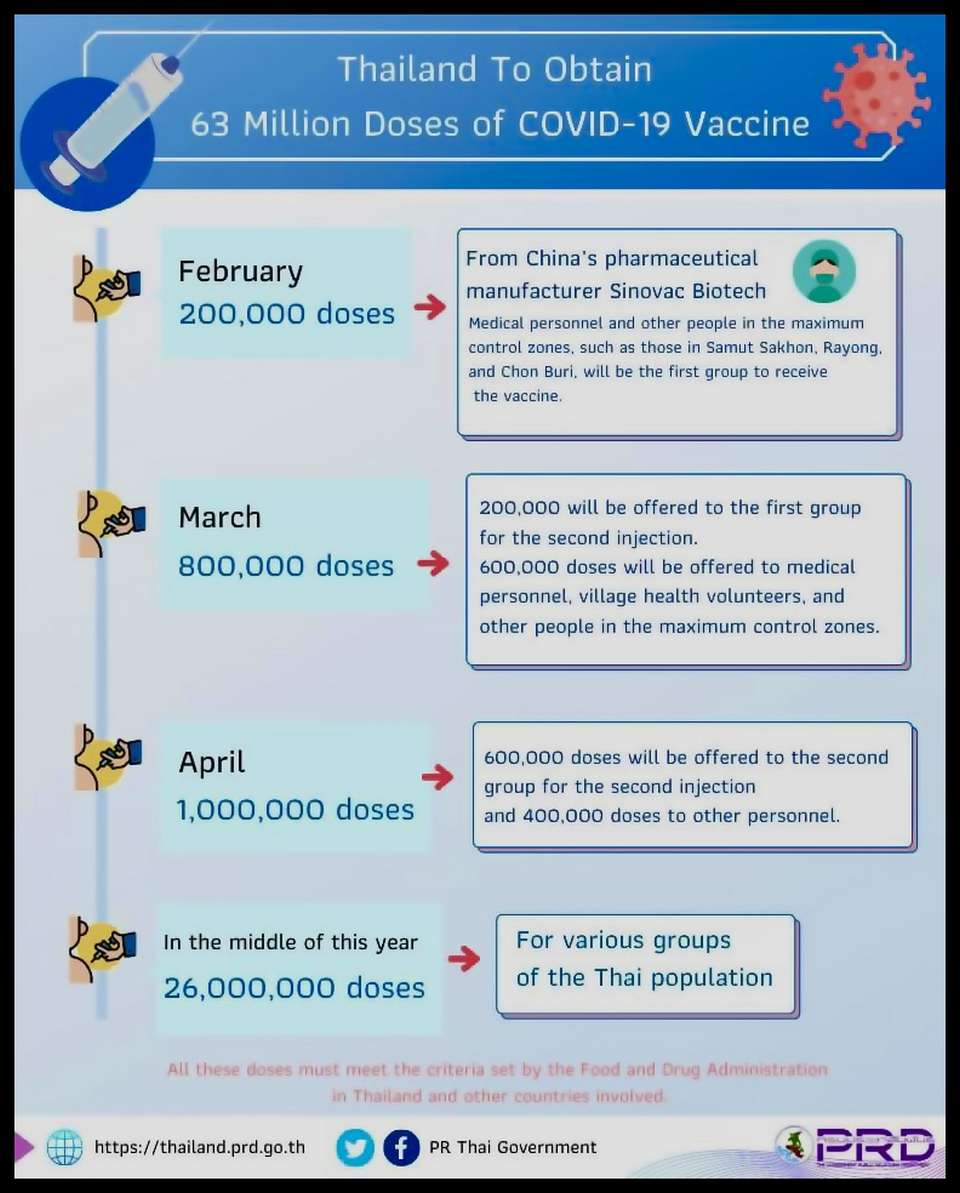
Bangkok – The Thai Cabinet has acknowledged that Thailand has ordered 63 million doses of COVID-19 vaccine from overseas.
The first shipment of 200,000 doses of vaccine is scheduled to arrive in Thailand in February from China’s pharmaceutical manufacturer Sinovac Biotech.
Medical personnel and other people in the maximum control zones, such as those in Samut Sakhon, Rayong, and Chon Buri, will be the first group to receive the vaccine.
The shipment of 800,000 doses of vaccine will arrive in March. Out of these doses, 200,000 will be offered to the first group for the second injection, while 600,000 doses will be offered to medical personnel, village health volunteers, and other people in the maximum control zones.
A shipment of one million doses will arrive in April. Out of these doses, 600,000 doses will be offered to the second group for the second injection and 400,000 doses to other personnel.
Thailand will obtain a further 26 million doses of vaccine in the middle of this year for various groups of the Thai population.
Thailand had earlier secured these doses through from AstraZeneca, which has developed the vaccine in partnership with UK’s Oxford University.
In addition, Prime Minister General Prayut Chan-o-cha has approved the purchase of another 35 million doses, bringing Thailand’s total order of Covid-19 vaccine to 63 million doses.
All these doses must meet the criteria set by the Food and Drug Administration in Thailand and other countries involved.
The Department of Disease Control announced that Thai residents can register for the first round Covid-19 vaccination at the end of this month, but no exact date has been released. Frontline healthcare workers as well as those who are in any of the 5 high risk provinces and considered the “most vulnerable” are first priority. The 5 provinces at high risk are Chonburi, Samut Sakhon, Rayong, Chantaburi and Trat.
According to AP reports Thailand signed a joint-venture agreement with AstraZeneca in October 2020 to produce up to 200 million doses of the vaccine in the country but only has been able to secure 26 million doses for itself. Thailand expects those vaccines, which will be produced locally by Siam Bioscience, to be delivered in June. Prime Minister Prayuth Chan-ocha also said Monday that Thailand is trying to obtain 63 million doses, enough to cover slightly less than half of its population. The cabinet on Tuesday approved a 1.2 billion baht ($39 million) budget for the vaccines, which will be offered at no charge to Thai citizens.
Back in November last year, the government had already said the money would come from its emergency budget of 6 billion baht reserved for the procurement of the vaccine. The budget of which 2.379 billion baht was to be allocated to the National Vaccine Institute for vaccine development and 3.59 billion baht to the Disease Control Department for vaccine procurement and management.
For much of 2020, Thailand had the coronavirus under control. After a strict nationwide lockdown in April and May, the number of new local infections dropped to zero, where they remained for the next six months.
Thailand closed its borders, enforcing mandatory quarantines for its own citizens and the handful of foreigners allowed to visit.
On Tuesday last week, the country reported 527 new cases, most of them illegal migrant workers linked to the seafood market outbreak in Samut Sakhon to the west of Bangkok. A day earlier, Thailand counted 745 new cases, an all-time high since the pandemic was first found in the country last January.
Thailand now has 10,053 total confirmed cases with 67 deaths.
In a statement issued last Saturday by Thailand’s Public Health Ministry said it is convinced that the second wave of the Covid-19 outbreak that has been raging since last month is likely to slow down by the end of January 2021.
Thailand has offered Illegal migrant workers from Cambodia, Laos and Myanmar an amnesty and will be allowed to work in Thailand for two years as part of government bid to monitor the Covid-19 spread. The Cabinet approved the Ministry of Labour’s proposal to grant the amnesty which also applies to the migrants’ children, as stipulated by the Immigration Act.
To implement the law, the Ministry of Interior issued new orders to the Department of Provincial Administration (DOPA) and the Bangkok Metropolitan Administration (BMA) to prepare registration documents and issue IDs for the migrants.
The Ministry of Public Health (MOPH) would conduct Covid-19 screening tests and health checkups and provide health insurance provisions for migrants.
To receive the amnesty, the migrants must register with the Ministry of Labour and pass all health screening requirements.





